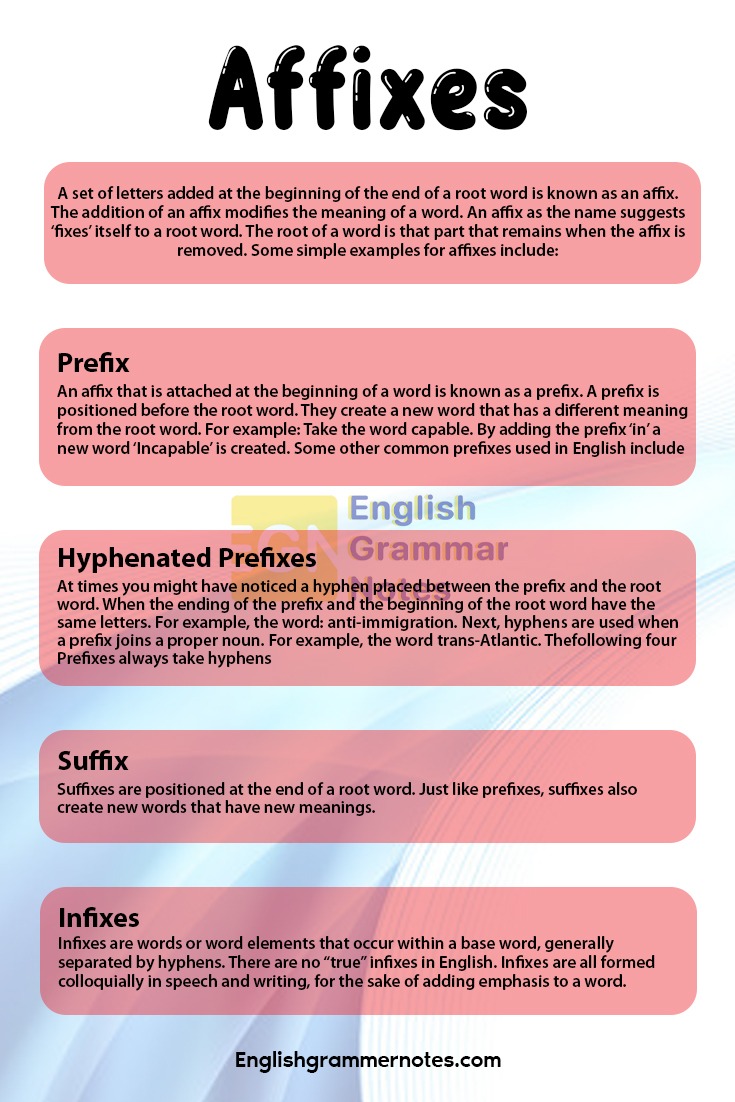We often like to make new words by adding all kinds of bits to the beginning and end of an existing word. Such bits added are known as Affixes.
For instance, take the word “mastered”. “Master” is the root word here, which can function as a noun or a verb, as per the context. When you add the letters ‘e’ and ‘d’ at the end of ‘master’, the verb form of the word changes to its past tense. The “ed” used here is an affix.
- Types of Affixes
- Prefix
- Suffix
- Infixes
- Combining Forms and Affixes
- Why Should You Care About Affixes?
- Is an affix added before the root word?
- Which are the two important types of affixes?
- What does Affixation mean?
- What is the function of an affix?
A set of letters added at the beginning of the end of a root word is known as an affix. The addition of an affix modifies the meaning of a word. An affix as the name suggests ‘fixes’ itself to a root word. The root of a word is that part that remains when the affix is removed. Some simple examples for affixes include:
- Laughing- The affix is the suffix -ing.
- Incapable- The affix is the prefix in.
- Ex-President- The affix is the prefix ex.
- Friendly- The affix is the suffix ly.
- Incomplete- The affix is the prefix in
- Beautiful- The affix is the prefix ful.
- Effortless- The affix is the prefix less.
Types of Affixes
Now that you know what an affix is let’s explore its types. There are three major kinds of Affix:
- Prefix
- Suffix
- Infix
Prefix
An affix that is attached at the beginning of a word is known as a prefix. A prefix is positioned before the root word. They create a new word that has a different meaning from the root word. For example: Take the word capable. By adding the prefix ‘in’ a new word ‘Incapable’ is created. Some other common prefixes used in English include
- dis- dislike, disown
- un- unlike, unlikely
- re- reunion, repeat
- in- inspire, interrogate
- anti- antibiotic, anti-national
- super- supervision, supermarket
- bi- bisexual, bipolar
Hyphenated Prefixes: At times you might have noticed a hyphen placed between the prefix and the root word. This is common in the below cases.
When the ending of the prefix and the beginning of the root word have the same letters. For example, the word: anti-immigration. Next, hyphens are used when a prefix joins a proper noun. For example, the word trans-Atlantic. The following four Prefixes always take hyphens:
- all- all-encompassing
- cross- cross-examination
- ex- ex-partner
- self- self- help
Suffix
Suffixes are positioned at the end of a root word. Just like prefixes, suffixes also create new words that have new meanings. The four most common suffixes are
- ed- respected, selected
- ing- loving, caring
- ly- lovely, slowly
- es- foxes, plosives
- able- disable, enable
- logy- biology, zoology
- ed- listed, gifted
In certain cases, the spelling of a root word is altered when a suffix is added. One such example would be the word “unimaginable”. Its root word is “imagine.” Generally when a word ends in a silent ‘e’, the suffix is added in the place of the silent ‘e’.
Hyphenated Suffixes: Hyphenated suffixes are used at the end of words. Just like hyphenated prefixes, they are not part of the word but rather are hyphenated after the word they intend to modify. Hyphenated suffixes are very rare.
- -free: The meat is fat-free.
- -based: His project is theory-based.
- -elect: She might become the President-elect.
- -style: They purchased a Mediterranean-style home.
Infixes
Infixes are words or word elements that occur within a base word, generally separated by hyphens. There are no “true” infixes in English. Infixes are all formed colloquially in speech and writing, for the sake of adding emphasis to a word.
Examples:
- fan-frickin’-tastic
- abso-bloody-lutely
- un-stinkin’-believable

Also, Read:
Combining Forms and Affixes
A study of affixes remains incomplete without knowing what combining forms are. Even though combining forms are not affixes, their function is similar to that of an affix.
A combining form refers to a new word that is built by combining two independent words or two affixes.
Affixes are added to prevailing root words or roots to modify the meaning, combining forms on the other hand creates new words.
Examples:
- para+ trooper= paratrooper (combination of independent words)
- – micro+ -scope= microscope (combination of two affixes)
Why Should You Care About Affixes?
Learning affixes can help you master the English language easily. Given below are some of the benefits of using affixes:
- Using an affix will reduce the word count: A word’s meaning is altered when you add an affix. You can use this to lessen your word count by one or two words and to create simple words. For example: Not aware > unaware, Not sure > unsure
- Helps You to Break down long words and learn spelling: The word antidisestablishmentarianism is best known not for what it means but for its length. If you break it down into affixes, it’s pretty simple to learn this word. The affixes in the word: Anti-dis-establ-ish-ment-Arian-ism, Hence mastering affixes will surely help you with spelling.
- Helps to Decode Meaning: Studying affixes in a word can help you in understanding its meaning.
FAQs on Affixes
1. Is an affix added before the root word?
No. Affix is not always added before the root word. A set of letters added at the beginning of a word or at the end is known as an affix.
2. Which are the two important types of affixes?
A set of letters added at the beginning or the end of a root word is known as an affix. The two kinds of affixes include prefixes and suffixes. A prefix is added before the root word whereas a suffix is added after the root word.
The process of adding affixes to the root word is known as affixation. The addition of an affix will bring about a meaning change.
4. What is the function of an affix?
A set of letters added at the beginning or end of a root word is known as an affix. Affixes play an important role in the creation of new words. Similarly, the addition of affixes can also change the meaning or form of the root word.
Conclusion
The addition of affixes at the beginning and end of words is useful to create new words and add new shades of meanings to the existing words. Hence make sure that you have a thorough understanding of affixes and their types. Study various English Vocabulary Words as well to improve your command over the language.
